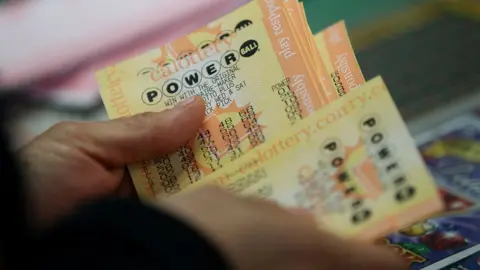Powerball winner sues for anonymity over $560m jackpot
 Getty Images
Getty ImagesThe winner of a $560 million (£400m) Powerball jackpot last month is suing state lottery officials in a bid to protect her anonymity.
The New Hampshire woman filed a civil complaint as Jane Doe, after making the "huge mistake" of signing the winning ticket without legal consultation.
State law says a winner's name, town and winning amount are public record.
But the woman later learned from a lawyer that she could avoid the law by claiming the lottery money via a trust.
The winner has not turned in her ticket yet, but showed lottery officials a photocopy of the front to support her claim for the country's eighth-largest lottery jackpot.
They told her that they would be compelled to disclose her identity in the event someone files a Right-to-Know request for the 6 January drawing.
However, she also wants "the freedom to walk into a grocery store or attend public events without being known or targeted as the winner of a half-billion dollars".
They argued her privacy interest outweighed the insignificant public interest in disclosing her name.
Charlie McIntyre, the state lottery's executive director, said in a statement that his agency understood winning such a large sum was a "life-changing occurrence".
But he added: "While we respect this player's desire to remain anonymous, state statutes and lottery rules clearly dictate protocols."
Fortune without the fame?
Currently only six states allow lottery winners to maintain their anonymity: Delaware, Kansas, Maryland, North Dakota, Ohio and South Carolina.
New Hampshire is among the few other states that allow people to form a trust to claim prize money anonymously.
In 2016, the state's winner of a $487m US Powerball jackpot chose to remain anonymous, claiming their prize through a trust facilitated by a local law firm.
Because the latest winner has already signed her name on the winning ticket, any alteration to the signature would nullify the ticket for $559.7 million.
Mr McIntyre said his office had consulted the state attorney general's office and that the Powerball winner's ticket would have to be processed "like any other".
